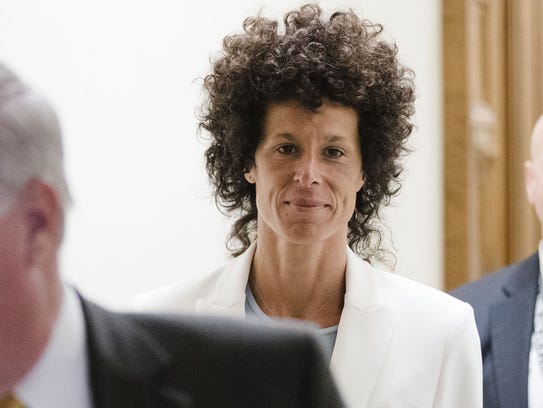
This article is more than
8 year oldAs jurors in the sexual assault criminal trial of entertainer Bill Cosby said they were deadlocked only to be instructed to try again by the judge Thursday morning, fans (and the media) wait. And wait.
Deliberations began Monday night after a rapid six days of testimony and closing arguments in front of Judge Steven O'Neill at the Montgomery County Courthouse in Norristown, Pa.
By Wednesday night, jurors asked the judge several questions seeking clarification and re-reading of excerpts of Cosby's own words about his 2004 encounter with accuser Andrea Constand at his nearby home.
For some experts and observers, drawn out deliberations had indicated possible disagreement among members of the jury.
A. Scott Bolden, defense attorney at Reed Smith, Washington, D.C., and a former prosecutor, said he was not surprised the jury was taking its time to process the case. "The jurors are grappling with getting it right," he says. "That takes time. They are looking at the facts and evidence regarding 'consent.' and they were reviewing the deposition section regarding the manner in which the defendant Cosby used drugs to deal with women. The consent issue is good for Cosby — the deposition is not."
STORY FROM BLEECKER STREETAttorney Michael Bressler, who has been watching the trial proceedings, said long deliberations, in general, could be an indication that an ongoing debate is happening behind the closed doors as jurors take “issue with some of the facts.”
Or, it simply could be a sign that the jurors are meticulous, he said. “You could have a conscientious jury that is taking their civic responsibility very seriously…wanting to do a diligent job of going through the evidence and making sure they understand it correctly,” said Bressler, who is co-counsel in the forthcoming sexual assault civil case,Green v. Cosby.
"A quick verdict will not be a good thing for Cosby," says Stuart Slotnick, a New York criminal defense attorney who has been following the case for more than two years. "That does not mean that a verdict that takes several days will be a good thing for him, but if the jury takes time deliberating that means they are discussing reasonable doubt and if they can believe the complainant."
What might lead to long deliberations?
Arthur “Terry” Lefco, an attorney at Philadelphia-based Marshall Dennehey Warner Coleman and Goggin, pointed to jury confusion as a factor. “When a jury is out for an extended period of time, one reason may well be is they’re confused over a legal issue, and particularly how to apply the facts,” said Lefco while he ate lunch Wednesday in the Montgomery County Courthouse cafeteria.
“But if there is not jury confusion, you also have the possibility of a jury holdout, where one or two or more people are opposed to the will of the others and unwilling to change their mind and that could last for a long time,” he said. “Peer pressure,” he added, often is enough to make the holdouts agree with the rest.
Nationally known jury expert Melissa Gomez, author of Jury Trials Outside In, said, "First, they could be very carefully reviewing the evidence to assure they feel that they have made the right decision. Second, there is likely disagreement on the panel, and so jurors are needing to discuss and debate their different perspectives."
She added, "They cannot reach a verdict until all of them agree. While diverse perspectives make for more thorough discussion and review of the evidence, it can also be very frustrating to jurors if other jury members are becoming more entrenched in their diverse positions instead of moving toward consensus. Both of these possibilities are exacerbated by the knowledge that the country is watching and that their verdict is going to have a life-altering effect on a celebrity who was once beloved. They want to get it right."
Gomez said, "The longer a jury takes to reach a decision, the more there is the possibility that they will be a hung jury, or that they will compromise to come to their verdict. Both of these possibilities could benefit the defense from certain perspectives. But, in the end, we all find out together when the verdict is read."

Bradford Cohen, a Florida criminal defense attorney, said lengthy deliberations are common during highly technical cases with numerous counts and defendants as well as copious amounts of evidence. But, he said, that scenario does not describe the Cosby case, which instead is “he-said-she-said.” In those cases, jurors who take days to come to a decision, often are engaged in a “battle of wits,” he said.
“My gut feeling is that they have at least one or two jurors hung,” said Cohen, who last year represented former-Donald Trump campaign manager Corey Lewandowski in a battery case. “That’s really what happens when you have a he-said-she-said case.”
Trial attorney Priya Sopori, partner at Greenberg Glusker in Los Angeles and a former federal prosecutor, said that without forensic evidence to consider, the jury is likely “asking themselves questions about what it means to consent to sexual activity."
She said, “I’m grateful that they are not rushing to a verdict. Any former prosecutor will tell you there is a huge difference between guilt in the eyes of God and guilt in the eyes of the law. ‘Beyond a reasonable doubt’ is the highest evidentiary standard known to our legal process, and this jury seems to be taking seriously its responsibility to weigh the evidence they’ve seen and heard.”
Contributing: Maria Puente in McLean, Va.